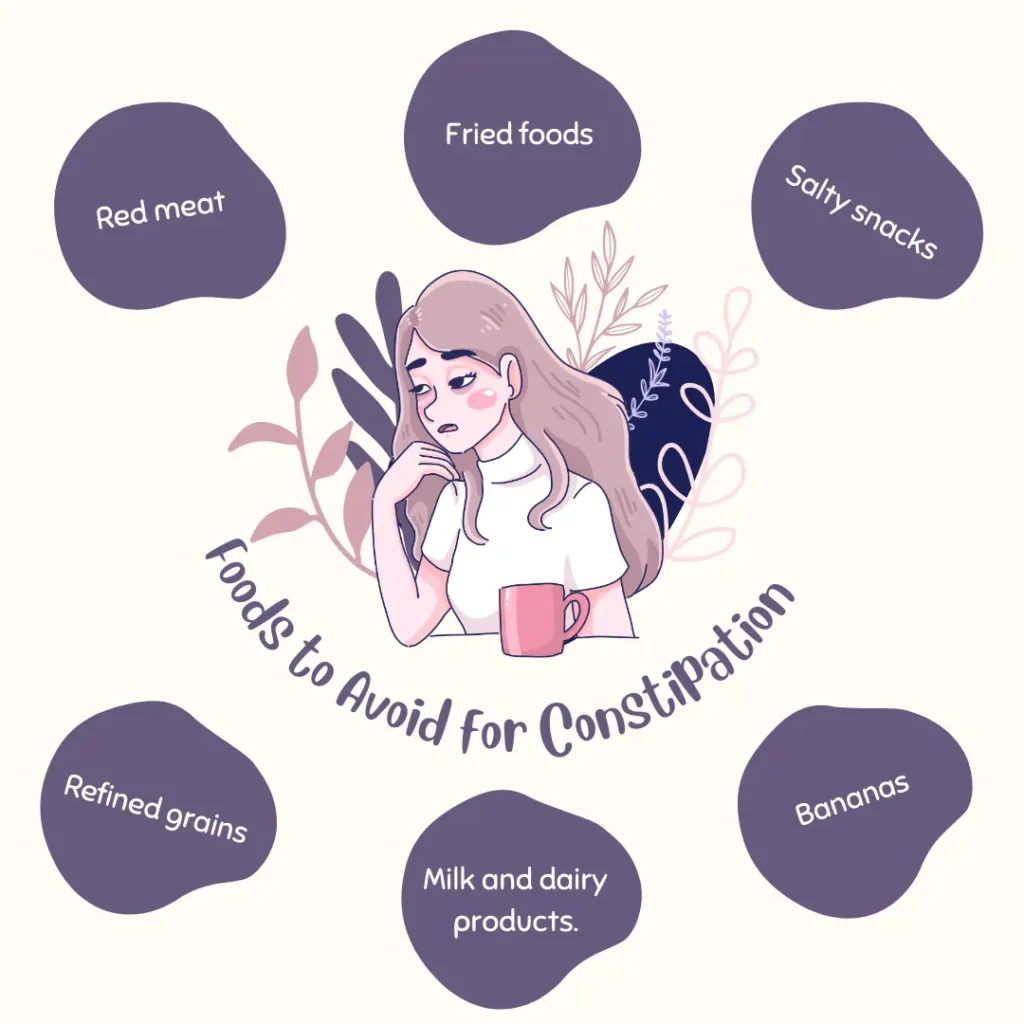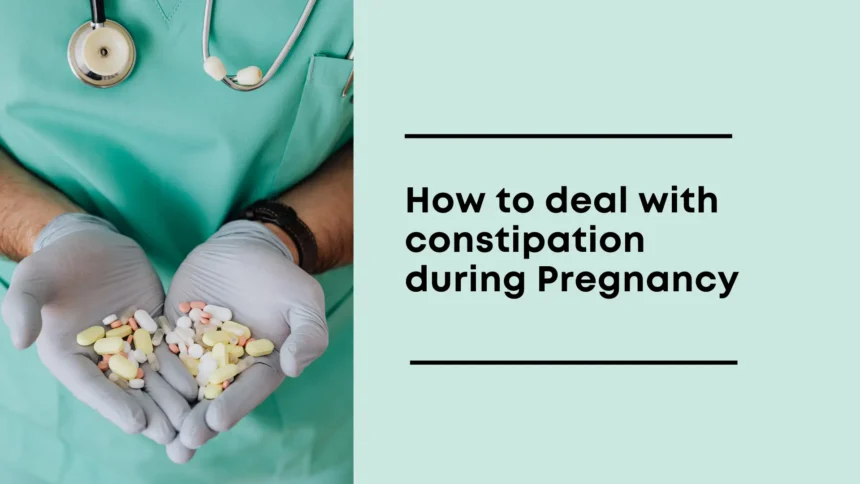Constipation is a frequent and uncomfortable pregnancy symptom that can last throughout the pregnancy. It might cause unpleasant symptoms such as abdominal pain, backache, bloating, piles, fatigue, and headache. Knowing how to control constipation quickly during pregnancy will enhance your overall health and quality of life.
Constipation affects some women early in their pregnancy, while others do not experience it until much later.
In this article, we will explain why constipation during pregnancy is frequent and present safe treatments and home remedies that women can take to alleviate their discomfort. The etiology of constipation during pregnancy is determined by the stage at which it occurs.
What are the causes of constipation during pregnancy?
- Hormones: Changing hormone levels in early pregnancy cause the intestines to hinder the passage of stool through the bowel. This delay increases the amount of water the colon absorbs from the stool, making it thicker and more difficult to pass.
- Prenatal vitamins are high in iron, an essential mineral that can be low during pregnancy. Low iron can lead to constipation and firm, black faeces.
- Pressure from the uterus: Later in pregnancy, the expanding uterus can press on the colon, making it challenging to transport faeces through the intestines.
- Constipation—having fewer than three bowel movements per week—is typical in pregnancy. According to the American Pregnancy Association (APA), almost half of all pregnant women experience constipation at some point throughout their pregnancy.
What are the Common symptoms of constipation during pregnancy?
- It is difficult to pass stools (poop).
- Hard, lumpy, and tiny stools.
- Irregular or infrequent bowel motions.
- Light cramping
- Lower abdominal ache
- Farting or passing gas
During the first and second trimesters, elevated levels of the pregnancy hormone progesterone might impair digestion and cause sluggish bowel movements. You are more prone to feel constipated during the third trimester. Your uterus gets heavier, putting more strain on your bowels. Straining during bowel movements and spending too much time on the toilet can raise your risk of developing hemorrhoids’, which are challenging, bulging veins in and around the anus.
What are the factors causing constipation during pregnancy?
Some medications mostly taken during pregnancy, such as those for nausea and vomiting, heartburn, and severe pain, can cause constipation. Iron and calcium supplements, as well as multivitamins that contain these minerals, might cause constipation. If you take any of these during pregnancy and experience constipation, consult your doctor. Changing the brand or dosage of your medication or supplement could improve your symptoms.
Lifestyle: Your food, the amount of fluids you consume daily, and how much you exercise all contribute to constipation.
Diet: Low dietary fiber levels may result in constipation during pregnancy, just as they can at any other time.
If you have constipation and plan a pregnancy, attempt to establish excellent habits before getting pregnant. Maintaining a nutritious diet, consuming lots of fluids, and getting regular exercise may help you have regular bowel movements. Constipation is better prevented early on than treated later.
Read More about Pelvic Floor exercise during pregnancy
How do you manage constipation during pregnancy?
- The first step in treating constipation is to boost your liquids and fibre intake. Consuming nutritious grains, fruits, and vegetables can frequently relieve constipation.
- Good toilet habits are also helpful.
- Eating and drinking, particularly a hot drink for breakfast, can increase the desire to go.
- Use a footstool to sit on the toilet, leaning forward with your feet apart while keeping your back straight.
- Avoid straining by consciously relaxing your abdominal muscles (imagine them bulging out).
- Most laxatives do not enter well into the bloodstream and can be used safely during pregnancy and breastfeeding. It’s still a good idea to see your consultant before taking any medications while pregnant.
Dehydration is one of the main causes of constipation. During pregnancy, your body needs more water to make blood for your baby. Drink eight to twelve cups of water daily. Ignore the idea that you only need eight cups of water every day. When pregnant, you should drink at least eight cups. You’ll need more fluid than usual to maintain your pregnancy and soften your stools. Water is the best option, but try other beverages if you don’t like it. Low-fat milk, smoothies, tea, and juices with no added sugar are all healthy choices.
How to relieve constipation with exercises?
- Get Active with Regular Exercise.
- Consistent activity throughout pregnancy can help alleviate constipation. Cardio exercise helps food flow faster through the large intestine, which speeds up digestion and allows you to poop more frequently.
- Attempt to acquire 30 minutes of moderate activity most days. When pregnant, choose activities that pose little danger of falling or injury, such as a brisk stroll, bike ride, or swim. In general, avoid excessive jumping or bouncing, particularly in high-impact or contact sports.
Read more about exercises to relieve constipation here.
Prenatal yoga and stretching are safe: Patients with specific health concerns or pregnancy complications should consult their doctor or midwife before starting a new activity.
Important: Avoid stimulant laxatives. These medications may dehydrate you or cause contractions.
Avoid mineral oil: Cod liver and other mineral oils decrease nutritional absorption.
What are the best exercises for constipation during pregnancy?
Simply getting up and exercising helps relieve constipation. A regular walking routine, even for 10 to 15 minutes many times per day, can help the body and digestive system function optimally. If you are already fit, you may want to try aerobic exercise such as running, jogging, swimming, or swing dancing. All of these workouts can help maintain your digestive tract healthy. Yoga and stretching may also assist with constipation.
Constipation foods to avoid:

Red meat.
- Red meat may exacerbate constipation for three reasons.
- First, it has minimal fibre,
- Second, red meat may indirectly diminish a person’s daily fibre intake by replacing higher-fibre foods.
- Furthermore, unlike other varieties of meat, such as chicken and fish, red meat often includes higher amounts of fat, and high-fat diets take longer for the body to digest. In other situations, this may raise the chance of constipation even further (
Fried foods
- Consuming big or frequent servings of fried or fast foods may raise the risk of constipation.
- That’s because these foods are high in fat and poor in fibre, which may interfere with digestion.
- Fast-food snacks like chips, cookies, chocolate, and ice cream may also replace more fibre-rich snack options, such as fruits and vegetables, in a person’s diet.
Milk and dairy products.
- Some people report that milk or cow dairy products cause constipation, which could happen for a variety of reasons.
- Those with lactose sensitivity commonly have diarrhea when they ingest dairy products.
Bananas:
- Bananas are a component of the banana, rice, apple sauce, and toast (BRAT) diet, which doctors historically suggested to treat diarrhoea. These foods were found to slow down bowel motions. As a result, these foods may not be suitable for persons who experience constipation.
Refined grains
- Foods made with refined flour, such as white bread, pizza dough, cakes, and baked pastries, are low in fibre.
- When combined with a low-fibre diet, this may lead to constipation.
- However, these particular items are not the source of the constipation. Instead, the problem is an imbalance between food categories. Eating more fruits, veggies, and whole grains could help.
Salty snacks
- Foods high in salt may cause constipation by dehydrating the body. When people consume a lot of salt but not enough water, the body extracts moisture from cells and the colon, causing the stool to become dry and difficult to pass.
- Salty meals that may contribute to this impact are:
- Food options include chips, fries, and packaged meats.



